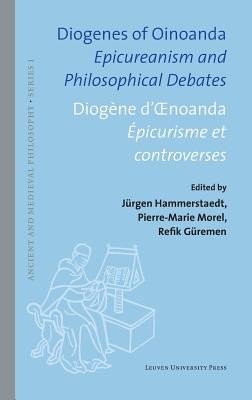
- Išsiųsime per 10–14 d.d.
- Leidėjas: Leuven University Press
- ISBN-10: 9462701016
- ISBN-13: 9789462701014
- Formatas: 15.6 x 23.4 x 2.1 cm, kieti viršeliai
- Kalba: Anglų
- Extra -15 % nuolaida šiai knygai su kodu: ENG15
Diogenes of Oinoanda/Diogène d'Oenoanda + nemokamas atvežimas! | knygos.lt
Atsiliepimai
Aprašymas
The texts of Diogenes of Oinoanda (2nd century AD) who invited his readers to an Epicurean life is the largest ancient inscription ever discovered. Over 70 new finds have increased the number of known wall blocks and fragments to nearly 300, offering new insights into Diogenes' distinctive presentation of philosophy. This collection of essays discusses the philosophical significance of these discoveries and is the first of this kind entirely devoted to Diogenes of Oinoanda. Particular attention is paid to his philosophical aims and polemical strategies. Diogenes was apparently well aware of still ongoing philosophical debates, engaging in polemics against Presocratic philosophers, Platonics, and especially Stoics. His views about important issues like happiness, fear, old age, and the afterlife are explained on the bases of Epicurean physics and theology, ethics, politics, theory of knowledge, and psychology.
Contributors: Martin Bachmann (The German Archaeological Institute), Michael Erler (University of Wurzburg), Alain Gigandet (University Paris - Est Creteil), Jean-Baptiste Gourinat (Centre National de la Recherche Scientifique/University of Paris - Sorbonne/Ecole Normale Superieure), Refik Guremen (Mimar Sinan University), Jurgen Hammerstaedt (University of Cologne), Giuliana Leone (University of Naples Federico II), Francesca Masi (University Ca' Foscari of Venice), Pierre-Marie Morel (University of Paris 1 - Pantheon Sorbonne / Institut Universitaire de France), Geert Roskam (KU Leuven), Martin Ferguson Smith (Durham University), Voula Tsouna (University of California), Francesco Verde (La Sapienza University of Rome)
EXTRA 15 % nuolaida su kodu: ENG15
Akcija baigiasi už 15:05:03
Nuolaidos kodas galioja perkant nuo 10 €. Nuolaidos nesumuojamos.

- Leidėjas: Leuven University Press
- ISBN-10: 9462701016
- ISBN-13: 9789462701014
- Formatas: 15.6 x 23.4 x 2.1 cm, kieti viršeliai
- Kalba: Anglų
The texts of Diogenes of Oinoanda (2nd century AD) who invited his readers to an Epicurean life is the largest ancient inscription ever discovered. Over 70 new finds have increased the number of known wall blocks and fragments to nearly 300, offering new insights into Diogenes' distinctive presentation of philosophy. This collection of essays discusses the philosophical significance of these discoveries and is the first of this kind entirely devoted to Diogenes of Oinoanda. Particular attention is paid to his philosophical aims and polemical strategies. Diogenes was apparently well aware of still ongoing philosophical debates, engaging in polemics against Presocratic philosophers, Platonics, and especially Stoics. His views about important issues like happiness, fear, old age, and the afterlife are explained on the bases of Epicurean physics and theology, ethics, politics, theory of knowledge, and psychology.
Contributors: Martin Bachmann (The German Archaeological Institute), Michael Erler (University of Wurzburg), Alain Gigandet (University Paris - Est Creteil), Jean-Baptiste Gourinat (Centre National de la Recherche Scientifique/University of Paris - Sorbonne/Ecole Normale Superieure), Refik Guremen (Mimar Sinan University), Jurgen Hammerstaedt (University of Cologne), Giuliana Leone (University of Naples Federico II), Francesca Masi (University Ca' Foscari of Venice), Pierre-Marie Morel (University of Paris 1 - Pantheon Sorbonne / Institut Universitaire de France), Geert Roskam (KU Leuven), Martin Ferguson Smith (Durham University), Voula Tsouna (University of California), Francesco Verde (La Sapienza University of Rome)




Atsiliepimai